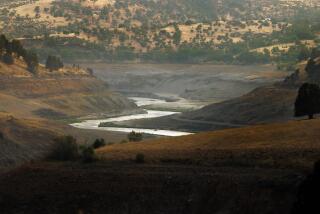When Botswanans Speak, Government Listens : Africa: The nation has one of the few democracies on the continent. Stunned officials recently backed down when an ambitious water plan was vociferously opposed.
- Share via
GABORONE, Botswana — A few months ago, the government of this arid southern African nation announced plans to start a $25-million river-dredging project intended to spur economic growth.
The idea seemed ingenious: Siphon a portion of water from Botswana’s wildlife-rich Okavango Delta to irrigate new farmlands and to supply badly needed water to thirsty northern towns and a particularly profitable diamond mine.
In most African countries desperate for development, such a scheme likely would have been stubbornly pursued by autocratic government officials, no matter the public’s opinion.
But here in Botswana, a nation of 1.3 million people where democracy seems more than an ethereal notion, something different happened: The public was invited by government officials to express opinions about the plan, which they did--with gusto.
“You will dry the delta! We will have no more fish to eat! No more reeds to build our houses!” exclaimed an elderly villager at a recent public meeting in the northern city of Maun, where more than 700 citizens berated government leaders for six hours over the project.
“We believe this river has a life of its own. God gave it to us. It is not for man to kill it,” a fisherman said.
These views were echoed by Western conservationists, who charged that the government had not given enough thought to the environmental consequences of the project and insisted that dredging would do irreparable harm to the Okavango’s wildlife.
The protesters vowed to do battle with bulldozers.
“I must tell you, it was a very inspiring moment,” said Douglas Tsiago, a journalist who covered the pivotal January meeting for Botswana’s Newslink Weekly. “It was democracy in action. I was very proud to see the people stand up and say what they thought was right.”
Days later, stunned by the public’s opposition, the government of President Quett Masire announced that the Okavango project was postponed indefinitely pending further study and technical consultations.
The dispute over the Okavango plan stands in stark contrast to more notorious capital development projects carried out by other governments in Africa, where critical decisions affecting the lives of millions of people are often made in a near vacuum of debate.
President Mobutu Sese Seko’s garish, multimillion-dollar palace in Gbadolite, Zaire, for instance, and President Felix Houphouet-Boigny’s $180-million Roman Catholic basilica in Yamoussoukro, Ivory Coast, might never have been built if the governments had been accountable to their people about the best ways to spend public money.
On a developing continent where demands for economic growth often conflict with the concerns of environmentalists, the Okavango Delta stands as one of Africa’s last largely unspoiled regions, one most favored by wealthy Western tourists able to afford the continent’s highest prices for tours.
It is an ecological treasure of swamps, grassy plains and baobab groves populated by buffalo, zebras, antelope, crocodiles and elephants roaming an 8,000-square-mile area in northern Botswana on the fringe of the Kalahari Desert.
The delta is fed by the Okavango River, which rolls for 60 miles into northwest Botswana with rainwater from neighboring Namibia and Angola before breaking up into vast swamplands and hundreds of smaller streams and tributaries.
This wealth of water is deceptive, however, for in Botswana severe water shortages are the rule. Much of the meager annual rainfall and surface water in this hot, dusty country is simply lost through evaporation.
Susceptible to frequent, devastating droughts, Botswana gets 80% of its water from scarce underground sources, with the Okavango River and the smaller Chobe River the only viable surface sources.
The unwieldy and unpredictable Okavango, however, and the ecologically fragile delta, which occupies a constantly changing, seismically active plain, are not easily controlled and have resisted previous attempts by man to manipulate river flows.
Two decades ago, two engineering attempts to dredge tributaries and to redirect and increase water flows to adjacent farmlands proved disastrous, resulting in the complete drying-up of the tributaries.
The problem--then as now--is that northern towns, particularly the growing city of Maun, need water badly, but the only available source seems to be the delta itself. Botswana’s total annual water demand was 157 million cubic yards in 1990 and is predicted to reach 262 million cubic yards by the turn of the century.
Botswana’s respected and time-honored custom of democratic decision-making underpins the country’s relatively free, multiparty political system, one of few democracies on a continent often associated with military dictatorships and crusty single-party fiefdoms.
“We have a saying in Botswana: A man is never strong until he says what he believes and gives other men the chance to do the same,” said President Masire. “I am proud to say without a doubt . . . we are a strong democracy . . . (and) this was democracy in action.
“But we still have a critical water problem to solve,” he cautioned. “We need some good ideas and suggestions now, not slogans.”
More to Read
Sign up for Essential California
The most important California stories and recommendations in your inbox every morning.
You may occasionally receive promotional content from the Los Angeles Times.













